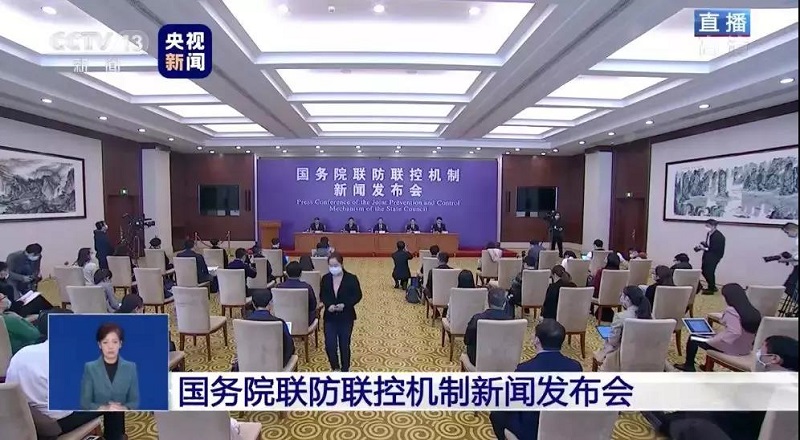Official Responses to Issues Concerning Immigration and Exit and Entry Management During COVID-19 Prevention and Control
Share on wechat
×
Use wechat to "scan" to share the web page with your wechat friends.

(Press Conference of the Joint Prevention and Control Mechanism of the State Council)
Guest: Liu Haitao, director general of the Department of Frontier Inspection and Management, National Immigration Administration
Venue: Beijing Rui'an Hotel
Date: March 2, 2020
Full Text
Journalist:
As the COVID-19 epidemic in neighboring countries is getting more severe, it has become more important for China to take rigorous steps to prevent imported cases while strengthening the domestic prevention and control measures. What measures have been taken by the National Immigration Administration (NIA) in the inspection of inbound travelers from high-risk countries, particularly its collaboration with customs quarantine departments?
Liu Haitao:
Since the outbreak, to practically prevent the spread of COVID-19 via exits and entries, NIA has actively collected and published the exit-entry control measures of relevant countries, reminded Chinese mainland residents and persuaded them into delaying or cancelling their outbound travels in a timely manner. In response to the warning, many residents have cancelled their travel plans and quite a few decided not to exit even when they have arrived at the ports. The voluntary and responsible actions taken by the residents have made notable contribution to the prevention and control of COVID-19 in China as well as to international public health and safety. Here, I'd like to express my appreciation to their cooperation and support.
As the risk of imported COVID-19 cases is rising, NIA has prioritized the prevention of imported cases as its key task and stepped up its efforts throughout all procedures. Before the arrival of international flights, big data analysis will be performed to screen travelers from countries (regions) worst-affected by the epidemic. The results will be reported promptly to customs quarantine departments, so that a great deal of time can be saved for the timely and effective testing and treatment of suspected or confirmed cases.
After the arrival of international flights, inbound travelers will be examined strictly in accordance with laws and regulations. Those found to have traveled, stayed or lived in countries and regions worst-affected by COVID-19 shall be reported to customs quarantine departments for inspection and quarantine. NIA has also actively shared information of inbound travelers from relevant countries (regions) with local health authorities of the places of entry. Local government authorities can carry out targeted responses and therefore mitigate and control the risk of imported cases.
Next, NIA will strengthen international cooperation by sharing information of inbound and outbound travelers with relevant authorities of countries hit hard by COVID-19, exchanging experience in exit-entry management and inspection technology. Efforts will also be made to enhance bilateral and multilateral collaboration to prevent the spread of COVID-19 via international travels.
Journalist:
Some foreign nationals in China said that they wouldn't be able to exit before their visas expire due to COVID-19. How does NIA think and what measures will it take in terms of exit-entry policies during the pandemic prevention and control?
Liu Haitao:
During the pandemic prevention and control period, expiring stay permit or residence permit of foreign nationals will be automatically extended for 2 months. They can stay in China legally and leave the country as usual without having to go through formalities within the extended period.
Chinese and foreign nationals engaged in the epidemic prevention and control such as medical rescue, medicine development and academic exchanges can enjoy 24-hour visa/permit services provided by local exit-entry administration authorities. Foreign nationals traveling to China for exchanges and cooperation for epidemic prevention and control, important commercial and trade businesses, or scientific researches, can apply for port visas at the ports in case of emergency.
NIA has also adopted "Internet plus government services", so that foreign nationals in China may have access to services including online application, application by mail and timely query of adjustment of exit-entry policies the same as Chinese nationals do.
Journalist:
There are messages on the Internet that flights from the Republic of Korea (ROK) to China are always fully booked, and it's very hard to buy a ticket. Some even say that people from ROK travel to China for refuge. Would you be able to confirm?
Liu Hiatao:
NIA has had a statistical analysis on the recent passengers traveling between China and ROK. Since the ROK government raised the COVID-19 alert level to the highest on February 23, there have been around 1,300 entries made by ROK citizens on a daily basis.
The data shows the situation that flights are fully booked and tickets are difficult to buy is tied to the reduction of flights by airlines after the outbreak. The number of passengers from ROK to China remains stable with a slight increase, where Chinese mainland residents take up around 70 percent of the total. The additional part is mainly attributed to Chinese mainland residents, and there is no sign of surging entries from ROK.
Notice: This English version is only for reference. To learn more, please refer to the authoritative Chinese version.


